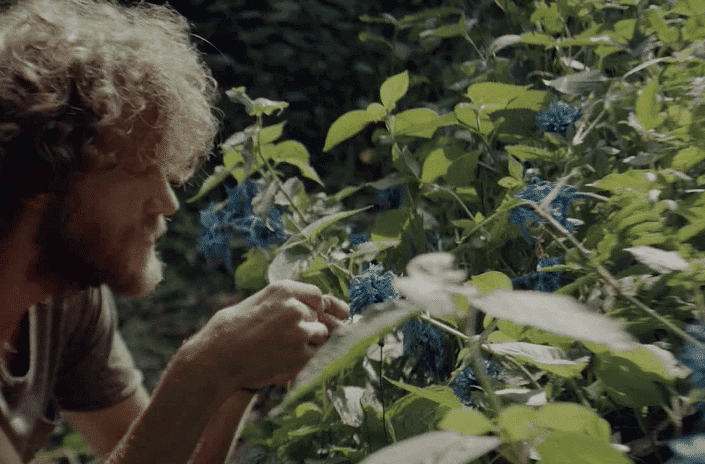IMPERIAL BLUE
(director/writer: Daniel Moss; screenwriter: David Cecil; cinematographer: Ezequiel Romero; editor: Robbie Gibbon/Chloe Hardwick; music: David Bryceland; cast: Ashish Verma (Sanjay), Paul Dewdney (Spiral Matt), Nicolas Fagerberg(Hugo Winter), Esther Tebandeke (Kisakye Gloria), Rehema Nanfuka (Angela Mbira), Nalubiri Ruth (Senga Betty), Kai Sunny Dirnberger (Bobby), Kyeyune Isaac (Trumba), Kayiwa Nicholas (Pape), Andrew Benon Kibuuka (Isaac Kasaija), Dumba Amina (Destiny), Amanda Dahl (Emma), Abby Mukiibi Nkaaga (Pastor John), Michael Wawuyo (Kitonsa); Runtime: 90; MPAA Rating: NR; producers: David Cecil/Semulema Daniel Katenda; Port Royal distributor/Blue Imp; 2019-UK/Uganda-in English and in African dialects, with English subtitles if needed)
“At times it’s scintillating.”
Reviewed by Dennis Schwartz
A low-budget indie about an unreliable young adventurer who is in serious trouble with a ruthless London drug dealer. The lad’s life is spiraling downhill and out of control because of drugs. In this offbeat drug film, there is a clever take on the familiar theme of a drug deal gone wrong. It shows how dangerous things can get when a misguided hippie is over his head when dealing with a ruthless gangster.
The filmmaker tries to make it different from the usual druggie film and succeeds to a certain extent, except the storytelling is too chaotic, the visuals are unclear and the filmmaker might be a little too green to lucidly get across his worthwhile message.
This is the debut feature by the Brit director Daniel Moss, who co-writes it as an innovative drama/fantasy/thriller with his fellow Brit David Cecil. At times it’s scintillating, but too many gaps in the story distort the logic and leave the pacing as too awkward.
The story spans three continents (Asia, Europe and Africa), but is set mainly in Uganda, Africa.
The dispirited American, living in London, Hugo Winter (Nicolas Fagerberg, a Swede by birth), travels hippie-style by backpack to India. The hedonist drug smuggler is working for a British drug dealer who could give a rat’s ass about drugs as a means of mind expansion. It’s strictly product to him, a capitalist venture even if illegal.
Outside the entrances of a Mumbai hotel, Hugo’s in the middle of a drug deal that’s raided by the police. As a result, he loses ten thousand dollars and the hashish. Hugo’s contact man, Sanjay (Ashish Verma), gives him a sample of Bulu, a rarely found blue-powdered hallucinogen (grounded down from blue flowers) from Uganda with mystical properties (it’s a fictional drug). Sanjay further mentions that “They say it makes you see the future.” This drug Hugo saves in his escape, and wonders if it will make him see enough money so he can pay off his debt to the dangerous drug dealer Spiral Matt (Paul Dewdney) and also make him rich. After fleeing the police, he rests and takes a hit from the Bulu he saved. The drug causes him to envision kissing a child in London.
Back home in London, his unfriendly wife is demanding child custody payments, while the venal drug dealer gives Hugo two weeks to square the money issues with him.
Fearing he has no other choice, Hugo goes to Uganda to track down a supply of the hard to find Bulu, believing that’s his best chance of getting out of his dire situation.
In a brothel in Kampala (the capitol), even as he gets robbed when with a whore, Hugo begins his search with the help from two sisters with competing agendas, the born-again Christian farmer, Kisakye (Esther Tebandeke), and the scheming worldly whore Angela (Rehema Nanfuka). They are in Kampala from the remote Makaana village, where Bulu is grown on their farm, as Angela is a runaway working in the brothel and Kisakye visits there to convince her to come back to the village to fight for her inheritance. The father of the sisters, a Bulu shaman, has recently died, and the unscrupulous Pastor John (Abby Mukiibi Nkaaga) and his cohorts move in to evict the sisters from their ancestral land by falsely claiming the land can now be taken lawfully for his church because of their father’s death. The resilient Kisakye will not give in to the crooked pastor and is prepared to fight back.
Kisakye knows how to prepare the Bulu, a blue flower that needs to be processed before it can be sold as a valued drug, but she doesn’t take the drug herself because she thinks it’s evil. Hugo partners with both the materialistic Angela and the earnest Kisakye by promising he can save their land and sell the Bulu abroad as a valuable product so they all will make enough money to satisfy their needs.
The three have entered a dark pact, and when forced to go deep into the jungle to secure the drug — their bad karma leads them to a dark spot, as things get bloody and messy.
The Black actors from the University at Kampala do a nice job playing such diverse characters.
The ambitious film comes with a warning to the citizens of Uganda: that it should keep its valued rare drug (natural resource) out of the hands of the wrong people like the Americans. As the drug is used as a metaphor to show how the white man is exploiting the Ugandans. Dealing drugs is seen as a step backwards for the African country.
Imperial Blue succeeds as being more than an ordinary action drug film, but stumbles despite its great location shots, its heady observations and its tense story, as it runs sometimes afoul because its execution is at times clumsy.

REVIEWED ON 2/10/2021 GRADE: B